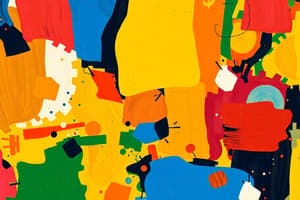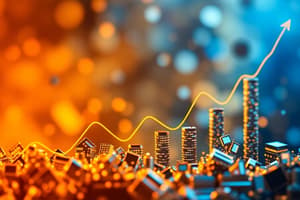Podcast
Questions and Answers
What distinguishes goods from services?
What distinguishes goods from services?
- Goods require human interaction for consumption, while services do not.
- Services are produced using raw materials like goods.
- Services are always more expensive than goods.
- Goods are tangible and can be stored, while services are intangible and cannot be stored. (correct)
Which of the following is NOT a broad category of economic resources?
Which of the following is NOT a broad category of economic resources?
- Natural resources
- Human resources
- Capital resources
- Political resources (correct)
How does economics differ from other social sciences?
How does economics differ from other social sciences?
- It focuses exclusively on wealth creation.
- It studies only market trends and prices.
- It analyzes human behavior with unique tools and methodologies. (correct)
- It is not concerned with human behavior.
According to Adam Smith's definition, what is the primary focus of economics?
According to Adam Smith's definition, what is the primary focus of economics?
Which economist is credited with emphasizing the concept of scarcity in economics?
Which economist is credited with emphasizing the concept of scarcity in economics?
In Alfred Marshall's view, what does economics primarily study?
In Alfred Marshall's view, what does economics primarily study?
What does the term 'oikonomia' refer to in the context of economics?
What does the term 'oikonomia' refer to in the context of economics?
Which of the following definitions of economics is associated with wealth accumulation?
Which of the following definitions of economics is associated with wealth accumulation?
Which category of economic resource includes natural resources like land, water, and minerals?
Which category of economic resource includes natural resources like land, water, and minerals?
What is a primary function of entrepreneurship in the production process?
What is a primary function of entrepreneurship in the production process?
Which of the following best describes labor as an economic resource?
Which of the following best describes labor as an economic resource?
What best defines an incentive in economic terms?
What best defines an incentive in economic terms?
What distinguishes a durable good from a non-durable good?
What distinguishes a durable good from a non-durable good?
In economic terms, which of the following is an example of a service?
In economic terms, which of the following is an example of a service?
Which type of economic good is characterized by being consumed immediately and is not meant for resale?
Which type of economic good is characterized by being consumed immediately and is not meant for resale?
Which of the following is considered a need?
Which of the following is considered a need?
Economic resources are defined as what?
Economic resources are defined as what?
What type of capital encompasses tools and equipment used in production?
What type of capital encompasses tools and equipment used in production?
What exemplifies the principle of thinking at the margin?
What exemplifies the principle of thinking at the margin?
Which of the following is NOT considered a factor of production?
Which of the following is NOT considered a factor of production?
Why do consumers face difficulty distinguishing between wants and needs?
Why do consumers face difficulty distinguishing between wants and needs?
How does the concept of scarcity affect consumer choices?
How does the concept of scarcity affect consumer choices?
What is the primary focus of microeconomics as a branch of economics?
What is the primary focus of microeconomics as a branch of economics?
Which principle is NOT part of the economics of individual choice?
Which principle is NOT part of the economics of individual choice?
Which of the following is a common response to an incentive?
Which of the following is a common response to an incentive?
How is the concept of opportunity cost best defined?
How is the concept of opportunity cost best defined?
What can be classified as a luxury want?
What can be classified as a luxury want?
Which of the following accurately differentiates between wants and needs?
Which of the following accurately differentiates between wants and needs?
Which statement best represents the idea of scarcity in economics?
Which statement best represents the idea of scarcity in economics?
In the context of economic decision-making, what does marginal analysis involve?
In the context of economic decision-making, what does marginal analysis involve?
What role do incentives play in economic behavior?
What role do incentives play in economic behavior?
Which of the following best describes goods in economics?
Which of the following best describes goods in economics?
What is the primary difference between a good and a service?
What is the primary difference between a good and a service?
Which of the following statements accurately describes economic resources?
Which of the following statements accurately describes economic resources?
What distinguishes needs from wants in economics?
What distinguishes needs from wants in economics?
Which statement about trade-offs is accurate?
Which statement about trade-offs is accurate?
What is the primary focus of microeconomics?
What is the primary focus of microeconomics?
Which of the following accurately describes the role of an entrepreneur?
Which of the following accurately describes the role of an entrepreneur?
What is a free good in economic terms?
What is a free good in economic terms?
In economics, what does it mean when people make decisions 'at the margin'?
In economics, what does it mean when people make decisions 'at the margin'?
Flashcards are hidden until you start studying
Study Notes
Economics as a Social Science
- Economics studies the relationships between people and societies, and how they make decisions with limited resources.
- It is considered the "queen of social sciences" due to its focus on human behaviour.
Economics Defined
- Economics is the study of how people make choices in the face of scarcity.
- The definitions of economics have evolved over time, focusing first on wealth creation (Adam Smith), then human welfare (Alfred Marshall), and finally on scarcity (Lionel Robbins).
Relevance of studying Economics
- Studying economics helps understand how individuals, businesses, and governments make choices in the face of limited resources.
- It provides tools to analyze complex economic issues, like resource allocation, production, consumption, and distribution.
Microeconomics vs Macroeconomics
- Microeconomics focuses on the behaviour of individual economic units, like households, firms, and industries.
- Macroeconomics studies the overall performance of the economy, including inflation, unemployment, and economic growth.
Principles of Individual Choice
- Scarcity: Resources are limited, while human wants are unlimited, creating a dilemma for individuals and society.
- Choice: In the face of scarcity, individuals make choices about how to allocate scarce resources.
- Opportunity Cost: The value of the best alternative forgone when a choice is made.
- Marginal Analysis: The comparison of the additional benefit of an action to the additional cost, to make rational economic decisions.
Incentives
- Incentives are rewards that encourage individuals to behave in certain ways.
- They can be positive (e.g., bonuses, promotions) or negative (e.g., fines, penalties).
Wants vs Needs
- Wants are desires or unnecessary things that can be satisfied by consuming goods or services.
- Needs are essentials for survival, such as food, shelter, and clothing.
Categories of Goods
- Economic Goods: Goods that are scarce and have a price.
- Free Goods: Goods that are abundant and have no price.
- Durable Goods: Goods that last for a long time (e.g., cars, appliances)
- Non-durable Goods: Goods that wear out quickly (e.g., food, clothing)
- Intermediate Goods: Goods used in the production of other goods (e.g., raw materials)
- Final Goods: Goods that are ready for final consumption (e.g., finished products)
- Consumer Goods: Goods purchased by households for personal use
- Capital Goods: Goods used in the production of other goods and services (e.g., machinery, equipment)
Goods vs Services
- Goods are tangible items that are used to satisfy human wants.
- Services are intangible activities or tasks are performed for others.
Economic Resources
- Land: Natural resources used in the production process, including land itself, water, and minerals.
- Labor: Human effort, skills, and knowledge used in the production process.
- Capital: Tools, equipment, and other productive resources used in the production process.
- Entrepreneurship: The human resource responsible for combining resources and taking risks to create new goods and services.
Studying That Suits You
Use AI to generate personalized quizzes and flashcards to suit your learning preferences.




